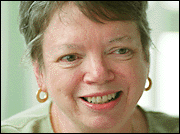

![]()
View Point


![]()
View Point
REGARDING the Star-Bulletin's July 12 editorial, "Close the Internet gap between rich and poor," there actually is a place where the Internet gap is being closed. Libraries are closing
Internet gapAmerica's public libraries have, for most of this century, been the places where economic and educational, social, physical, mental distinctions are eliminated.
Long before the Internet, librarians provided books for those people who:
Could not afford to buy them.
Could not afford to pay for their education and thus needed access to information on a myriad of subjects.
Were looking for a job or re-entering the workforce.
Needed information on job placement, resume-writing and interviewing skills.
For the entrepreneur setting up a small business in a declining economy, we provided information and access to support resources.
And, always, we have been the place where parents brought their children to learn the love of reading.
When the Internet began developing as a pathway to information resources, libraries continued to do the same things we have always done.
We made the Internet accessible in our buildings, for everyone, but especially for those who didn't have a computer at home or at school.
Congress recognized the vital role that public libraries play in lessening the gap between information haves and have-nots when it passed the Telecommunications Act of 1996.
This act authorized the establishment of an e-rate fund, which provides schools and libraries discounted rates on telecommunications costs.
Here's another recognition of public libraries' role in closing the Internet gap between rich and poor: Sometime in late 2000 or early 2001, Hawaii's public libraries will receive Internet access computer workstations and telecommunications connections under the Gates Library Initiative program.
By the year 2003, the Gates Foundation expects to complete making grants to every state. The grants are given for the purpose of eliminating the "digital divide" and making Internet access available, unmediated, in libraries -- especially for those people who do not yet have computers.
Gates chose public libraries for his initial efforts to eliminate this "digital divide" because of our congruity of purpose -- to eliminate the gap between the rich and the poor.
THE Hawaii State Public Library System, by law, serves all state residents and serves them all equally. Access to the Internet is an important and by now integral part of our program of services.
For us, it is another in a long line of tools we use to provide access to the world of education, information, and literary and artistic products of our cultural and social history. It is a window on a world that people may not have access to anywhere else.
Our libraries are doing now what we've always done -- making information and education available to everyone. Now it's the Internet.
Before this, it was CD-ROMs and online services. Prior to that, it was card catalogs.
In the beginning, it was simply the knowledge that a librarian carried around in her head.
After the Internet, our mission will still be the same: to provide pathways to make information and education available to all.
Virginia Lowell is Hawaii's state librarian.